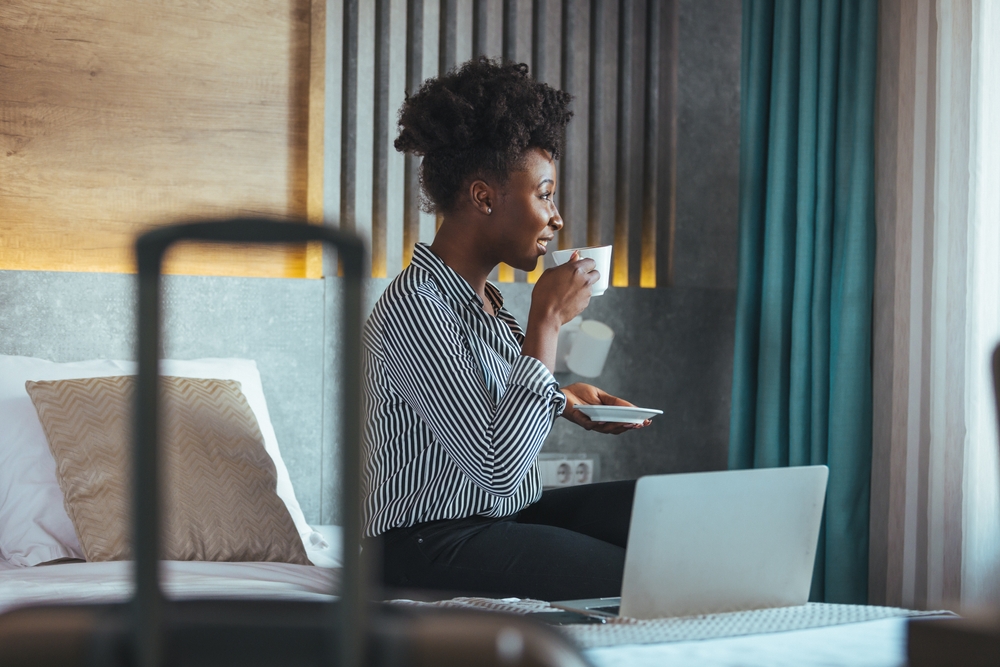Traveling alone can be an empowering and enriching experience for women. It offers the freedom to explore new places at one’s own pace, meet new people and enjoy solitary reflection. However, solo travel also comes with unique challenges, particularly regarding personal safety. For women traveling alone, ensuring hotel security is paramount. Here are five crucial hotel security protocols to keep in mind to enhance safety and ensure a pleasant stay.
1. Choose the right hotel
Selecting a safe and reputable hotel is the first step in ensuring security during your solo travels. Consider the following tips when choosing your accommodation:
Research and reviews
Before booking, thoroughly research potential hotels. Look for reviews from other solo female travelers, as they often highlight security aspects specific to women traveling alone. Websites like TripAdvisor and Booking.com can be invaluable resources for reading firsthand experiences.
Location matters
The hotel’s location plays a significant role in safety. Choose a hotel in a well-lit, busy area rather than in a secluded or sketchy neighborhood. Proximity to public transport and major attractions can also reduce the risk of encountering unsafe situations.
Safety features
Ensure the hotel has essential safety features such as 24-hour front desk service, secure entry points and surveillance cameras. Some hotels offer women-only floors or rooms equipped with additional security features, providing an extra layer of comfort.
2. Secure your room
Once you’ve chosen a hotel, the next step is securing your room. Even in the safest hotels, taking extra precautions can help you avoid potential threats.
Door locks
Always use the deadbolt or chain lock when you’re inside your room. If the room lacks these features, request a room change or consider using a portable door lock or wedge for added security.
Room location
Opt for a room that is not on the ground floor, as these are more susceptible to break-ins. Rooms between the third and sixth floors are ideal, balancing accessibility with security. Additionally, avoid rooms near emergency exits or stairwells, which can be isolated and less secure.
Valuables safety
Use the hotel safe to store your valuables, such as passports, electronics and money. If a safe is not available, consider bringing a portable travel safe or lockable bag. Ensure that housekeeping and other staff cannot access your valuables without your knowledge.
3. Be cautious with personal information
Protecting your personal information is vital to maintaining your safety while traveling. Be mindful of how and where you share your details.
Check-in process
During check-in, avoid saying your room number aloud. Ask the receptionist to write it down if necessary. This prevents potential eavesdroppers from knowing your exact location.
Social media
While it’s tempting to share your travel experiences in real-time on social media, consider delaying posts until after you’ve left a location. Avoid tagging your hotel or revealing your exact whereabouts online, as this can attract unwanted attention.
Discretion with strangers
Be cautious when discussing your travel plans with strangers. Avoid sharing details about where you’re staying or your itinerary. If someone asks, keep your responses vague and general.
4. Stay vigilant in hotel common areas
Common areas in hotels — such as lobbies, elevators and restaurants — can pose potential risks. Staying vigilant in these areas can help you avoid uncomfortable or dangerous situations.
Elevator safety
When using hotel elevators, stand near the control panel and be ready to press the emergency button if needed. If someone makes you feel uneasy, trust your instincts and exit the elevator at the next available floor.
Lobby awareness
In the lobby, be aware of your surroundings and keep an eye on your belongings. Avoid leaving bags unattended, even for a short period. Choose well-lit, busy areas to sit or wait.
Dining precautions
When dining in a hotel restaurant or ordering room service, be cautious of your drink and food. Avoid leaving them unattended. If something tastes or looks off, do not consume it. Trusting your instincts in these situations is crucial.
5. Have an emergency plan
Despite taking all precautions, emergencies can still happen. Having a plan in place can make all the difference in a crisis.
Know the exits
Familiarize yourself with the hotel’s emergency exits and evacuation routes as soon as you check in. Knowing the quickest way out can be lifesaving in case of a fire or other emergencies.
Emergency contacts
Keep a list of emergency contacts, including local emergency numbers, the nearest embassy or consulate and a trusted friend or family member back home. Ensure your phone is always charged and accessible.
Hotel staff
Build a rapport with the hotel staff. Friendly and helpful staff can be a valuable resource in emergencies or if you need assistance during your stay. Don’t hesitate to ask for help if something feels wrong or if you need information.
Safety and the solo female traveler
Traveling alone as a woman can be a rewarding and liberating experience, but it requires a heightened sense of awareness and preparedness. By following these five crucial hotel security protocols, you can significantly reduce risks and ensure a safer and more enjoyable trip. Remember, your safety is paramount, and taking these precautions can help you travel with confidence and peace of mind. Happy travels!
This story was created using AI technology.











